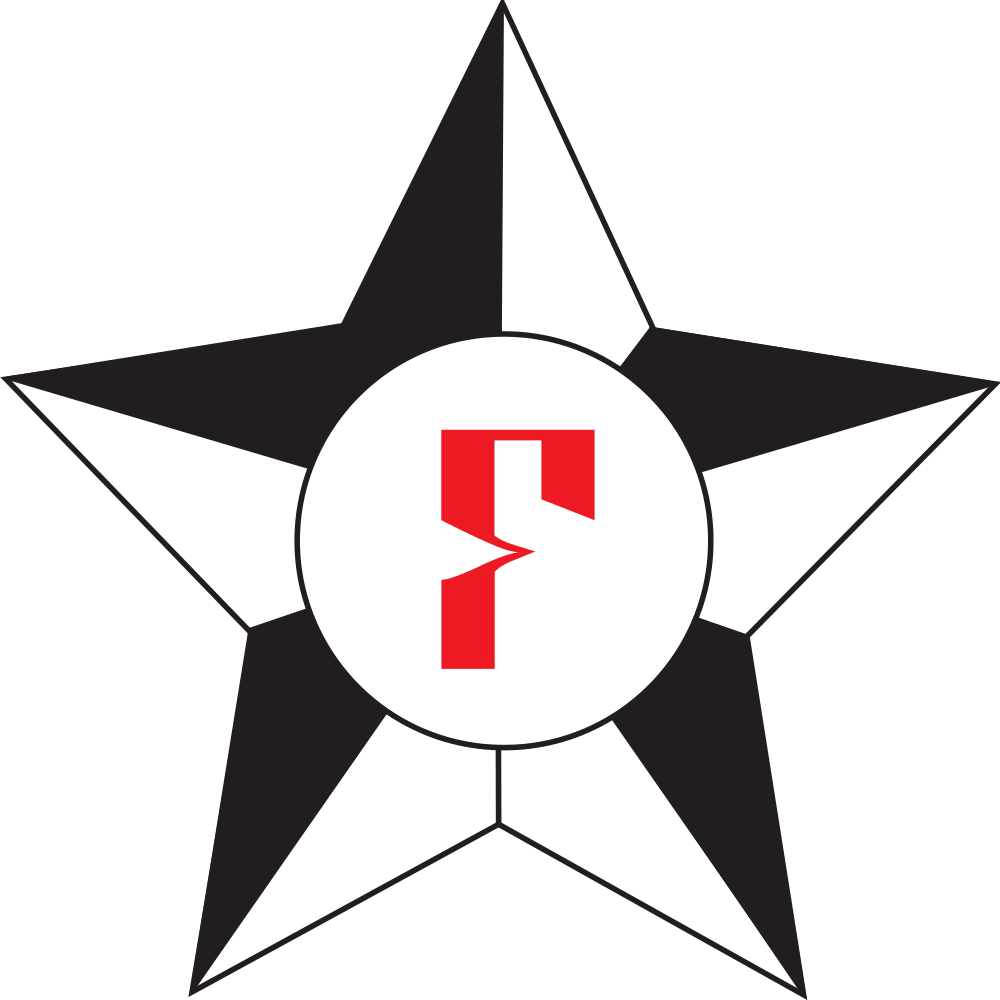F*'s Extensible Effect System
and
Metaprogramming in F*
Schedule
-
Friday: A Gentle Introduction to F* (Purely Functional Programs)
-
Yesterday: Verifying Stateful Programs in F*
-
Today: Monotonic State in F*
-
Today: F*'s Extensible Effect System and Metaprogramming in F*
This talk
-
Monadic effects in F*
-
Verifying effectful programs extrinsically (monadic reification)
-
Under the hood: Weakest preconditions (and Dijkstra monads)
-
Tactics and Metaprogramming as a user-defined, non-primitive effect
Monadic effects in F*: Global State
type st (mem:Type) (a:Type) = mem -> Tot (a * mem)total reifiable new_effect {
STATE_m (mem:Type) : a:Type -> Effect
with (* functional representation of the global state effect *)
repr = st mem;
(* standard monadic return and bind for the state monad *)
return = fun (a:Type) (x:a) (m:mem) -> (x, m);
bind = fun (a b:Type) (f:st mem a) (g:a -> st mem b) (m:mem) ->
let (z, m') = f m in
g z m';
(* standard get and put actions for the state monad *)
get = fun () (m:mem) -> (m, m);
put = fun (m:mem) _ -> ((), m)
}total reifiable new_effect STATE = STATE_m heap- this monadic definition is the model F* uses to verify stateful code
- state can be primitively implemented under the hood, or not
Programming with effects, in direct style
-
In F* the programmer writes:
let incr_and_assert () : STATE unit user_spec = let x = get() in put (x + 1); assert (get() > x) -
Which is then made explicitly monadic via type and effect inference:
let incr_and_assert () : STATE unit inferred_spec = STATE.bind (STATE.get ()) (fun x -> STATE.bind (STATE.put (x + 1)) (fun _ -> STATE.bind (STATE.get ()) (fun y -> STATE.return (assert (y > x))))) -
And the SMT-solver is asked to discharge the VC to typecheck it
forall s0 k. user_spec s0 k ==> inferred_spec s0 k
Monadic lifts in F*: State + Exceptions
let stexn a = nat -> Tot ((either a string) * nat))new_effect {
STEXN: a:Type -> Effect
with (* functional representation of the sum of state and exceptions monads *)
repr = stexn;
(* standard monadic return and bind *)
return = fun (a:Type) (x:a) s0 -> (Inl x, s0);
bind = fun (a b:Type) (f:stexn a) (g:a -> stexn b) s0 ->
let (r,s1) = f s0 in
match r with
| Inl ret -> g ret s1
| Inr m -> (Inr m, s1)
(* action of raising exceptions *)
raise = fun (a:Type) (msg:string) s0 -> (Inr msg, s0);
}sub_effect STATE ~> STEXN {
lift = fun (a:Type)
(e:st nat a) (* st comp. *)
->
fun s -> let (x,s1) = e s0 in (Inl x, s1) (* stexn comp. *) }Programming with multiple effects, in direct style
-
In F* the programmer writes:
( / ) : int -> x:int{x<>0} -> Tot int let divide_by (x:int) : STEXN unit user_spec = if x <> 0 then put (get () / x) else raise "Divide by zero" -
Which is then elaborated to:
let divide_by (x:int) : STEXN unit inferred_spec = if x <> 0 then STATE_STEXN.lift (STATE.bind (STATE.get()) (fun n -> STATE.put (n / x))) else STEXN.raise "Divide by zero" -
And the SMT-solver is asked to discharge the VC to typecheck it
forall s0 k. user_spec s0 k ==> inferred_spec s0 k
Under the hood
Weakest preconditions (Dijkstra monads (for free))
Computation types indexed by predicate transformers
Pre- and postconditions are just syntactic sugar:
Pure t (pre : Type0) (post : t -> Type0)
= PURE t (fun k -> pre /\ (forall y. post y ==> k y))
(* where k is the "true" postcondition,
for which we compute the weakest precondition *)val factorial : x:int -> Pure int (requires (x >= 0))
(ensures (fun y -> y >= 0))val factorial : x:int -> PURE int (fun k -> x>=0 /\ (forall y. y>=0 ==> k y))Same for user-defined effects, like STATE:
ST t (pre : nat -> Type0) (post : nat -> t -> nat -> Type0)
= STATE t (fun n0 k -> pre n0 /\ (forall x n1. post n0 x n1 ==> k x n1))val incr : unit -> St unit (requires (fun n0 -> True))
(ensures (fun n0 _ n1 -> n1 = n0 + 1))val incr : unit -> STATE unit (fun n0 k -> k () (n0 + 1))Computing weakest preconditions, by example
let incr () = STATE.bind (STATE.get()) (fun x -> STATE.put (x + 1))- By inferring type for
incragainst following interface:
… F* computes the weakest precondition forSTATE.get : unit -> STATE nat (STATE.get_wp ()) STATE.put : n:nat -> STATE unit (STATE.put_wp n) STATE.bind : STATE 'a 'wa -> (x:'a -> STATE 'b ('wb x)) -> STATE 'b (STATE.bind_wp 'wa 'wb)incrval incr : unit -> STATE unit inferred_wpinferred_wp = STATE.bind_wp (STATE.get_wp()) (fun x -> STATE.put_wp (x+1)) = fun n0 k -> k () (n0 + 1) - Generic way of computing weakest-preconditions for all effects
- provided we have a monad structure on predicate transformers
- instance of a more general structure of monad-graded monads
Predicate transformers monad for state
aka a Dijkstra monad for state
let STATE.wp t = (t -> nat -> Type0) -> (nat -> Type0)
val STATE.return_wp : 'a -> Tot (STATE.wp 'a)
val STATE.bind_wp : (STATE.wp 'a) -> ('a -> Tot (STATE.wp 'b)) ->
Tot (STATE.wp 'b)
val STATE.get_wp : unit -> Tot (STATE.wp nat)
val STATE.put_wp : nat -> Tot (STATE.wp unit)-
whose implementation is given by:
let STATE.return_wp v = fun p -> p v let STATE.bind_wp wp f = fun p -> wp (fun v -> f v p) let STATE.get_wp () = fun p n0 -> p n0 n0 let STATE.put_wp n = fun p _ -> p () n -
and for a while we wrote such things by hand for each new effect;
-
but this is quite tricky and comes with strong proof obligations
(correctness with respect to effect definition, monad laws, …)
Dijkstra monads for free
STATE.wp t = (t -> nat -> Type0) -> (nat -> Type0)
~= nat -> (t * nat -> Type0) -> Type0-
This can be automatically derived from the state monad transformer
STATE.repr t = nat -> M (t * nat)by selective continuation-passing style (CPS) translation
Mis the monad-argument of the monad transformer- it marks where the CPS-translation happens
- type system (conservatively) restricts where the marker
Mcan appear
-
This works well for many natural examples of monadic effects:
STATE,EXN,STEXN,CONT, etc. (explicitly definable monad transformers)- ongoing work to try to extend this idea to a wider class of effects
-
Summary: From a monadic effect definition we can derive a
correct-by-construction weakest-precondition calculus for this effect.
Verifying effectful programs extrinsically
Monadic reification and monadic reflection
Verifying effectful programs
New way: extrinsically (by exposing pure monadic representation)
-
Monadic reification
STATE.reify : (St a) -> (nat -> Tot (a * nat)) -
Monadic reflection takes us in the other direction
STATE.reflect : (nat -> Tot (a * nat)) -> (St a)
- The above types are very much simplified, in their full generality:
reifysends aSTATEcomp. with a WP to aPUREcomp. with a WPreflectsends aPUREcomp. with a WP to aSTATEcomp. with a WP
Extrinsic reasoning using reification and reflection
-
Reification allows us to give weak specification to a program
let incr () : St unit = STATE?.put (STATE?.get() + 1) -
and give an extrinsic proof of their correctness
let lemma_incrs (s0:state) : Lemma (let (_,s1) = reify (incr ()) s0 in s1 = s0 + 1) = () -
Reflection allows us to write some code as pure
let incr' (): St unit = STATE?.put (STATE?.reflect (fun s0 -> (s0,s0)) + 1) -
and it cancels out reification in verification
let lemma_incrs' (s0:state) : Lemma (let (_,s1) = reify (incr' ()) s0 in s1 = s0 + 1) = ()
Extrinsic reasoning using reification and reflection ctd.
-
It also allows us to reason about different runs of the same program
let state = int * int (* (high - low) values *) let st (a:Type) = state -> M (a * state) total reifiable reflectable new_effect { STATE : a:Type -> Effect with repr = st; ... }let incr (n:int) : St unit = STATE?.put_low (STATE?.get_low() + n) let incr2 () : St unit = if (STATE?.get_high() = 42) then (incr 2) else (incr 1; incr 1) let non_interference () : Lemma (forall h0 h1 n. let (_,(h0',n' )) = reify (incr2 ()) (h0,n) in let (_,(h1',n'')) = reify (incr2 ()) (h1,n) in n' = n'') = () -
or even about different runs of different programs
Reification works pretty well
-
Reducing effectful verification to pure verification
- for which F* already has good support (i.e. SMT automation)
-
Recent experiments using this for “relational verification”
- correctness of program transformations
- information flow control
- proofs of algorithmic optimizations (memoization, union-find)
- simple game-based cryptographic proofs
-
Downside: reification doesn't play well with monotonic state
- cannot naively safely reify the real
STATEandStackeffects - doing it naively allows you to replay old states with
recall - ongoing work to solve it based on hybrid modal logics
- unfortunately reification also starts to act on the context
- cannot naively safely reify the real
Metaprogramming in F*
Tactics as a user-defined, non-primitive effect
Tactics (New, Still Experimental)
-
F* tactics written as effectful F* code (inspired by Lean, Idris)
-
have access to F*'s proof state (and can efficiently roll it back)
-
can introspect on F* terms (deep embedding, simply typed)
-
can be interpreted by F*'s normaliser(s)
-
or compiled to OCaml and used as native plugins
-
user-defined, non-primitive effect: proof state + exceptions monad
noeq type __result a = | Success of a * proofstate | Failed of string * proofstate let __tac (a:Type) = proofstate -> Tot (__result a) (* reifiable *) new_effect { TAC : a:Type -> Effect with repr = __tac; ... } let tactic (a:Type) = unit -> Tac a
Tactics can discharge verification conditions (replacing SMT)
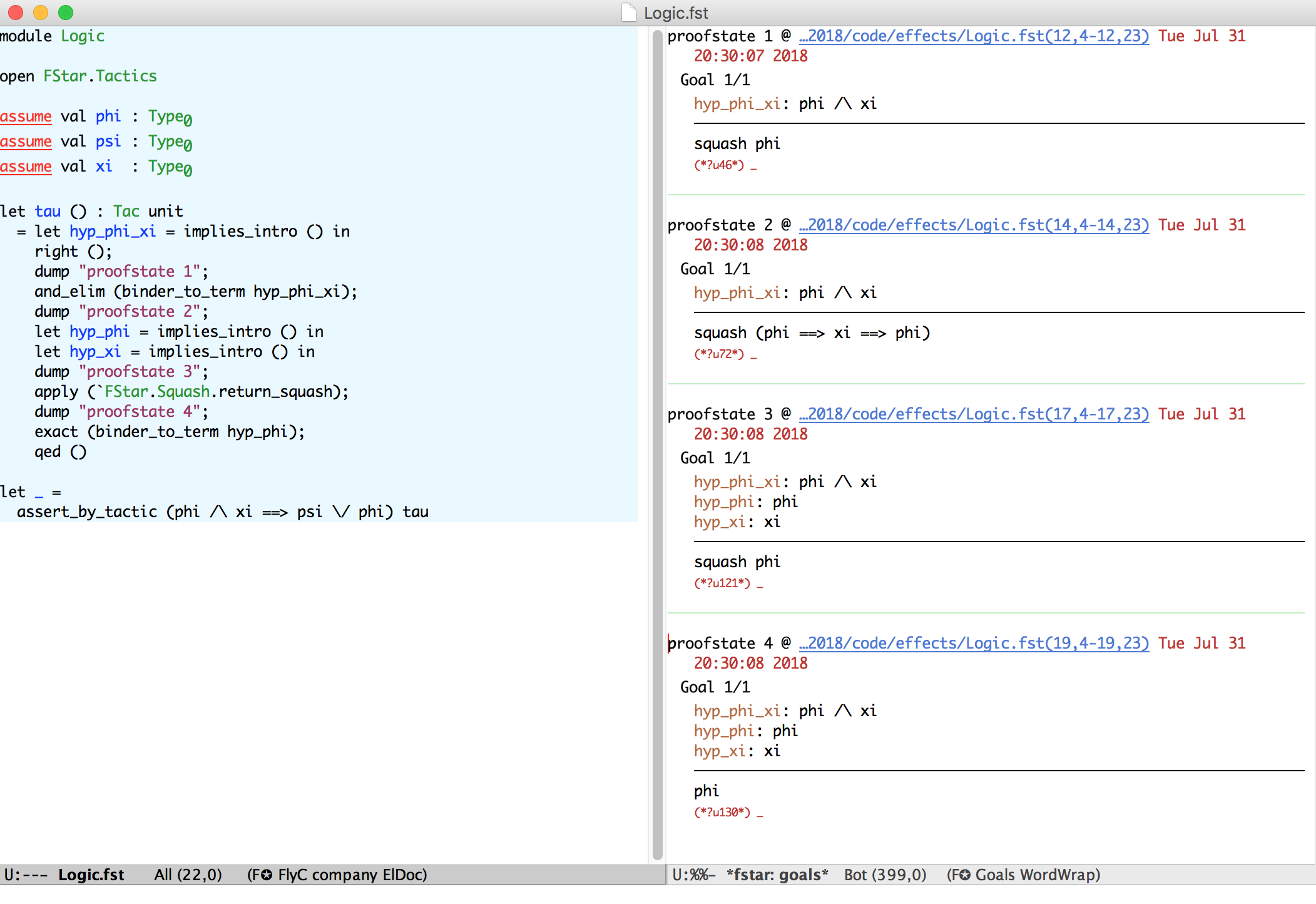
Tactics can massage verification conditions (complementing SMT)
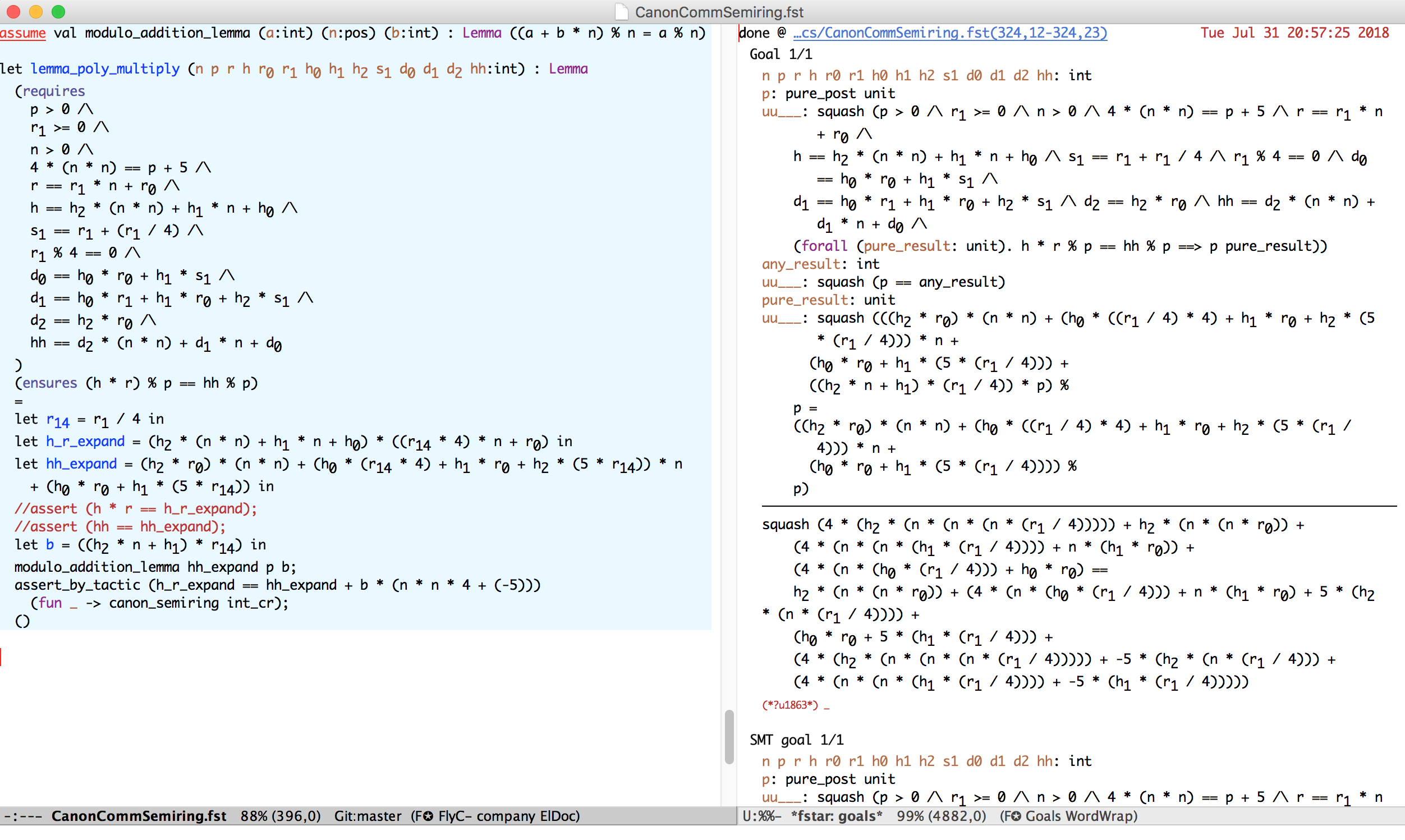
Tactics can synthesize F* terms (metaprogramming)
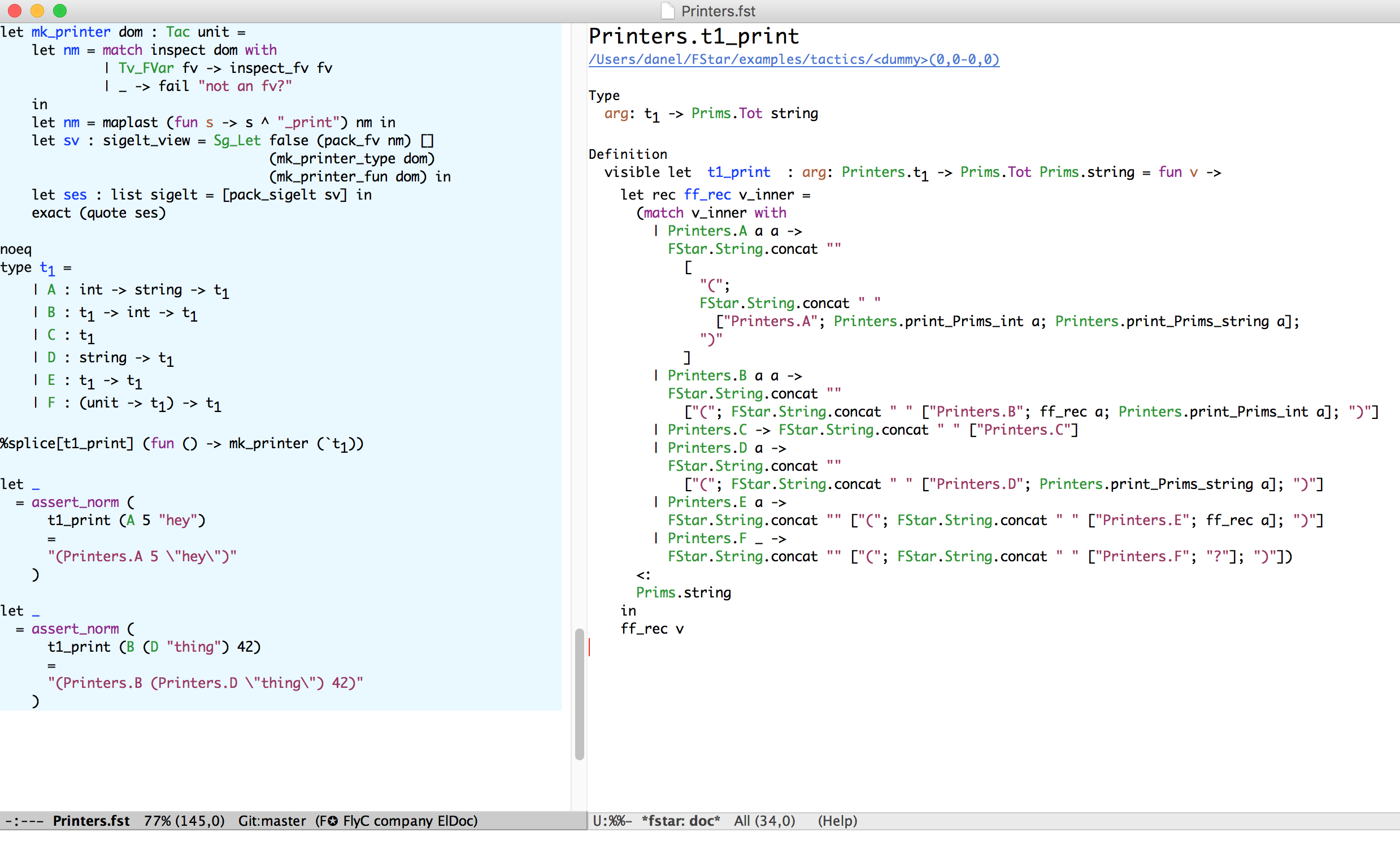
Tactics have also been used to extend F* with typeclasses
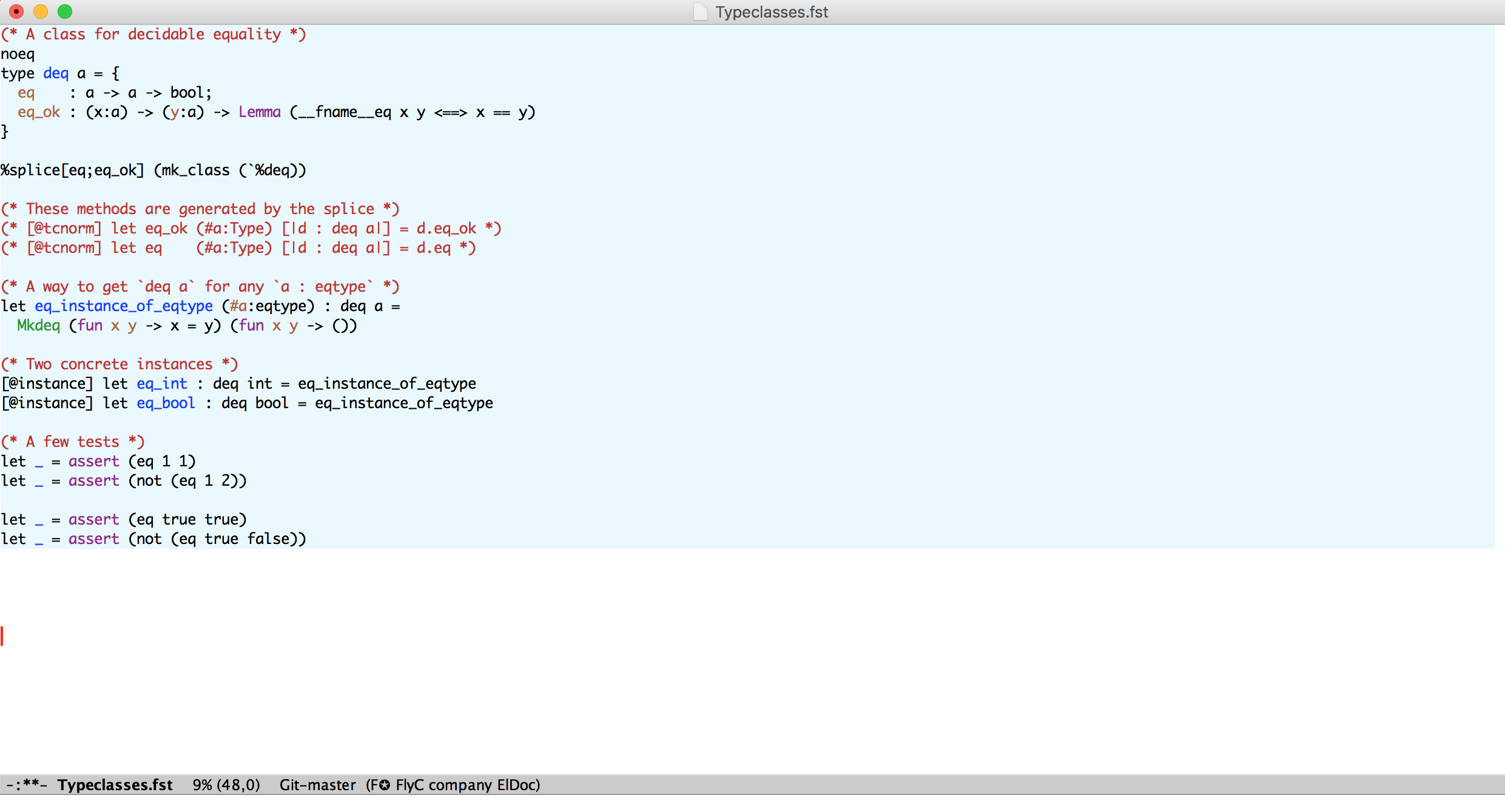
Some uses of tactics
-
Reflective tactics for arithmetic (proof automation)
-
Bitvectors in Vale (proof automation)
-
Separation logic (proof automation)
-
Pattern matcher (metaprogramming)
-
Efficient low-level parsers and printers (metaprogramming)
Time to conclude!
-
Friday: A Gentle Introduction to F* (Purely Functional Programs)
-
Yesterday: Verifying Stateful Programs in F*
-
Today: Monotonic State in F*
-
Today: F*'s Extensible Effect System and Metaprogramming in F*
